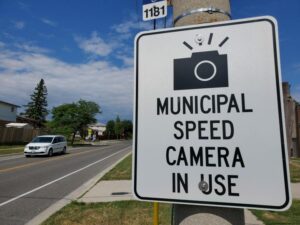By: Anmolpreet Singh
BELLEVILLE – People in Belleville are reacting to the recent installation of new speed cameras in the city.
The cameras are part of an Automated Speed Enforcement (ASE) program in an effort to make roads safer..
“I’ve seen the cameras around,” Zail Singh said. Singh has been a Belleville resident for three years.
“I think they’re good for stopping people from speeding, but not everyone likes them.”
These cameras are placed in areas where speeding is a problem, especially near schools and busy streets. The program includes four cameras that can be moved to different locations based on safety needs.

Speed Cameras installed in Belleville.
The speed cameras will be placed in the following community safety zones around the city:
- Victoria Avenue (between Humewood Drive and Park Lane)
- Palmer Road (between Bridge Street West and Dundas Street West)
- Harder Drive (between Avondale Road and Palmer Road)
- Sidney Street (between Moira Street West and Bridge Street West)
- Cannifton Road (between College Street East and Bell Boulevard/Adam Street)
- Sidney Street (between Tracey Street and College Street West)
- Harmony Road (from Highway 37 to 449 Harmony Road)
- Dundas Street East (between George Street and First Street)
- Ashley Street (between Ducette Road and Old Madoc Road)
- College Street East (between North Front Street and Cannifton Road)
Fines for speeding in these areas are higher than usual, as they aim to discourage speeding in places where safety is a concern.
1 to 19 km/h over the speed limit: $5 per km/h over, plus extra costs.
20 to 29 km/h over the limit: $7.50 per km/h over, plus extra costs.
30 to 49 km/h over the limit: $12 per km/h over, plus extra costs.
These fines may change depending on rules set by the Ministry of Transportation.
Even if someone else was driving your car when the speeding happened, you are still responsible for paying the fine. You will need to pay it within 30 days, but if you want to contest the ticket, instructions on how to do so will be found on the back of the ticket.
While these tickets don’t lead to demerit points, they could still affect your insurance rates. You will need to check with your insurance company to see if a speeding ticket will impact your premiums.

Zail Singh shares his thoughts on speed cameras. photo by Anmolpreet Singh
Zail Singh said the cameras have made him more cautious when driving.
“I’m more careful now, especially in areas where I know there’s a camera,” he said. “I pay more attention to my speed.”
Singh mentioned that his friend recently got a $20 ticket for driving 4 km/h over the speed limit on Sidney Street.
“She wasn’t happy about it,” Singh said. “But she was speeding, so it’s fair.”
While some people think the cameras are just a way for the city to make money, Singh doesn’t agree.
“I’ve heard people say it’s just about making money because the tickets are expensive,” he said. “But I think the main reason is to make the roads safer.”
Singh also noticed that the cameras have reduced speeding in certain areas, particularly near schools and busy streets.
“People seem to slow down where the cameras are,” he said. “I think they’re doing their job.”
Rahul Sharma has lived in Belleville for over five years. He has a different perspective on the new speed cameras.
Sharma says he understands that the cameras are meant to improve road safety, but he feels they might not be the best solution.
“I get why they put them up,” he said. “But for drivers who are only a few kilometres over the limit, it’s tough. The fines can add up quickly, and not everyone can afford that.”
When asked if he thinks the cameras are effective, Sharma was doubtful.
“People usually slow down when they know there’s a camera around,” he explained. “But as soon as they pass it, they might start speeding again. It doesn’t really change their habits.”
Sharma also raised concerns about the effect of these tickets on insurance.
“Getting a ticket is one thing, but if it raises your insurance, it becomes even more costly,” he said. “The city should think about other ways to handle speeding, like having more police patrols or adding speed bumps in problem areas.”
On the question of whether more cameras should be installed, Sharma isn’t convinced.
“I don’t think we need more cameras,” he said. “Instead, there should be more community education about safe driving. And maybe drivers could get a warning before they’re fined.”
While Sharma agrees that Belleville’s roads need to be safer, he believes that the city might want to consider other approaches. He feels more police presence and road improvements could work better than cameras alone.
 Print This Post
Print This Post






